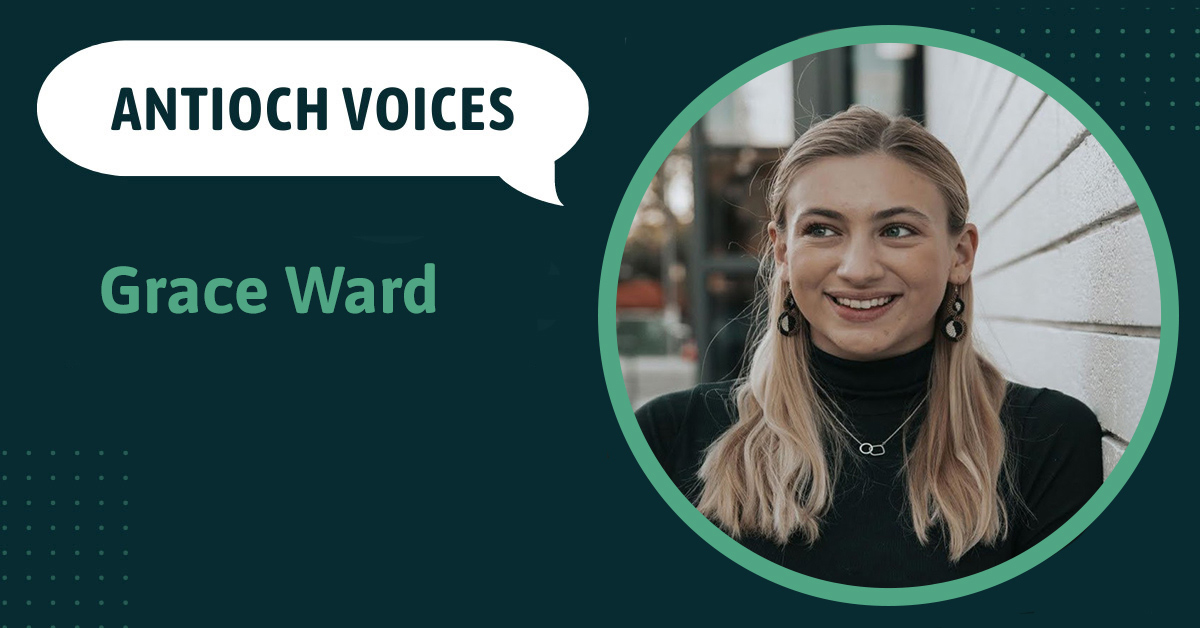This essay is part of Antioch Voices, a forum for Antiochians to speak out about issues important to them. Opinions expressed here belong to the author alone and do not necessarily reflect the official position of Antioch University. If you’d like to share your own voice, the first step is to send a short description of what you are planning to write about to [email protected].
This essay is adapted from remarks Ward gave as the graduate speaker for the Antioch MFA in Creative Writing at the Antioch University Los Angeles Commencement Ceremony on June 29, 2025.
Good morning, everyone! It’s an honor today to speak on behalf of my beloved Iris MFA cohort. I’d like to extend a heartfelt thank you to the staff, faculty, administrators and loved ones who have made all of this possible for us. To my fellow Irises, today is the day. Can you believe it?
I’d like to begin with a quote that has been particularly meaningful to me recently:
In the dark times
Will there also be singing?
Yes, there will also be singing.
About the dark times.
This quote is from a poem by Bertolt Brecht, a playwright I have extremely mixed feelings about.
Here are two things you should know about Brecht. First, he was a famous misogynist. He’d probably have strong opinions about this courtyard today, and the amount of brilliant, highly educated women in it. To that I say: good. He can stay mad.
Second, Brecht fled Germany in 1933, when the Nazi Party rose to power. Despite the clear and present danger, he kept writing plays about fascism and the abuse of power. One, The Resistible Rise of Arturo Ui, follows a cabbage-mafia kingpin with startling similarities to Hitler. Though the play later found success, it was written in the early days of WWII—a time when writing such a script in Germany would have meant death or imprisonment. Not an easy time to be a writer. But then, is there ever an easy time to be a writer?
I have to admit something to you all—and I hope you’ll still respect me after hearing it. More than once, after a long day of struggling to do homework while the world feels like it’s on fire and AI is taking what feels like all of my jobs, I’ve asked myself: Why couldn’t I have been born in an easier time to be a writer?
Like Jane Austen! She’s been published, translated, and adapted thousands of times. They make Jane Austen-scented candles. She had it so much easier than me, right? That said, she was also rejected by publishers so regularly—because of her gender alone—that she took to carrying the full manuscript of Sense and Sensibility around in her bag, just in case. And despite her success, she was never able to publish under her own name in her lifetime.
Or Toni Morrison! With talent like hers, it had to have been easy! She was an artist of the highest caliber. She redefined American literature. But how hard did she have to fight to be taken seriously among her peers? White men, with a fraction of her skill, telling her her stories wouldn’t sell. Easy, right?
I know I sound crazy. Isabel Allende, there’s a writer who had it easy! James Baldwin, total walk in the park! Don’t even get me started on August Wilson, Elena Ferrante, Emily Dickinson, J.R.R. Tolkien, or Frank O’Hara. It was all just so much easier for them! And everybody knows Woody Guthrie wrote his best music when times were easy, right? Are you seeing my point?
There is not—there will never be—an easy time to do this. But here we are, doing it anyway.
We don’t do this because it’s easy.
We are tasked with capturing the stories of our generation, holding the hearts of our communities in our hands, and translating them into words. That is a daunting task for any writer. But we are not just any writers, are we? We are Antioch MFA grads. We have a not-so-secret weapon in our battle against injustice. We have one another.
We all chose a program that values community over competition, and for the last two years we’ve been building that community, cultivating champions, collaborations, and lifelong friendships. This path we have chosen will not be simple, but I can promise you all this: we are walking it together.
My friends, to return to the Brecht quote from earlier: there will always be dark times. Likewise, there will also always be singing.
We cannot get stuck in the darkness. We must carry on knowing that writing will never be easy. But it will always be necessary.
Because there will also be singing about the dark times. And now, as Antioch MFA graduates, we get to be the ones writing the songs.

Grace Ward
Grace Ward is a playwright and author from Boise, Idaho. She is a graduate of The National Theatre Institute, Boise State University, and recently graduated from the Antioch MFA in Creative Writing. As a playwright, her work has been produced with Connective Theatre Co, Surel’s Place, Brick by Brick Players, The Minnesota Fringe Festival, Storyfort, and more. She is also a founding member of Fishmarket Theatre Collaborative (NYC) and Haute Nautilus Theatre (Boise). When she’s not writing, Grace loves to ski, mountain bike, and collect postcards.





